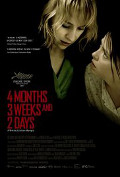
Directed by
Cristian Mungiu
113 minutes
Rated MA
Reviewed by
Sharon Hurst


4 Months, 3 Weeks, 2 Days
Synopsis: It is 1987 in Romania. Otilia (Anamaria Marinca) and Gabita (Laura Vasiliu) are roommates in a university dorm. Gabita is pregnant and desperate for an abortion in a country where the procedure can only be procured illegally. After lying to her boyfriend Adi (Alex Pitocean), who expects her at his mother’s birthday party, Otilia goes off to meet Mr Bebe (Vlad Ivanov) and takes him to a hotel where Gabita nervously waits.This remarkable and harrowing film has just won this year’s Golden Palm at Cannes and the FIPRESCI (International Jury) prize. The director, whose three prior films are totally unknown to me, speaks of his inspiration as being true stories he heard after Romania passed its anti-abortion laws in 1966. Apparently more than half a million women died from these ghastly illegal procedures before it was again legalised at the end of the communist regime.
The squalid run-down conditions of Romanian life are captured in the first scenes in which we meet the girls, living typically student lives but obviously under the thumb of the communist regime. In the streets we see queues of people outside the grocery store and basics like cigarettes are black market items but despite privations there is a sense of the camaraderie typical of a student group.
In one way the plot is incredibly simple but the structure of the story and the way it is presented give the audience the suspense of a thriller with the tension of what could happen to these girls both physically and in a legal sense. When the girls make their booking into a hotel every transaction must be greased with bribes. But if the system is corrupt the character of Bebe is incredibly odious, especially as he seems like such a reasonable man when the girls first meet him and the true cost of what they are asking of him is beyond what they (or we) could have expected. Everything about the scene in the hotel room is horrendous but in a totally calm and measured way. An exceptionally effective shot is that of Bebe laying out his crude instruments and “sterilising” them – all done in one continuous shot that doesn’t once show his face. As he gives instructions for what should happen and how to dispose of the foetus we recoil at the matter-of-fact callousness of it all. To further heighten the film’s realism the director has chosen to have one continuous shot per scene and this is stunningly effective, especially in one powerful episode where Otilia has to suffer through a visit to Adi’s parents whilst inside she is totally traumatised.
Every performance is a tour-de-force. Vasiliu’s Gabita is weak, nervous and ineffectual and it is Otilia, who organises everything for her friend. The latter is on-screen in virtually every scene of the film. Director Mungiu says the aim of his film was to capture “emotion and truth” and this he achieves completely. It’s not often you feel a film has such a ring of truth, that you are in fact standing in the room and observing people in real life, rather than acting. This level of authenticity comes from both the outstanding script and its delivery by outstanding actors.
The abruptness of the film’s ending was perhaps the only moment that disappointed me. Besides that, 4 Months, 3 Weeks, 2 Days is one of the most haunting and grippingly compelling stories I’ve seen all year.
Want something different?





